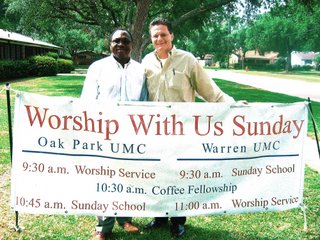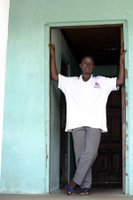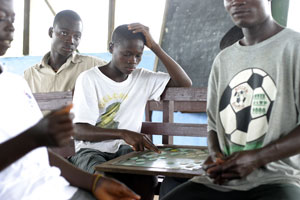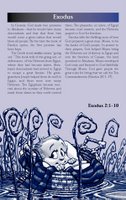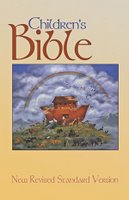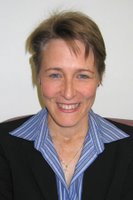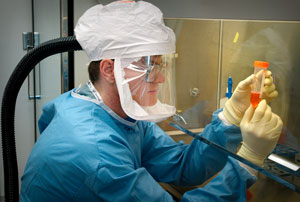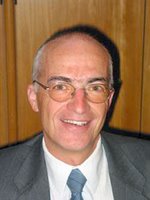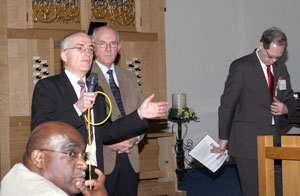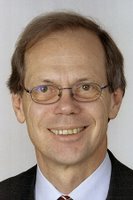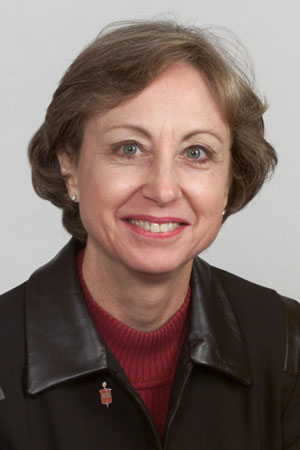Mission Leader Rejects All Immigration Proposals Before the U.S. Congress
New York, NY, May 25, 2005—The chief mission executive of The United Methodist Church says that none of the current legislative proposals before the Congress are “adequate to address the full range of issues related to a just, humane immigration policy.”
The Rev. R. Randy Day described as “inhumane and punitive” a bill adopted late last year by the House of Representatives. He said that that some provisions of a measure before the Senate also fan the flames of “xenophobia, or the fear and dislike of strangers.” Rev. Day is general secretary of the United Methodist General Board of Global Ministries.
He said that White House and legislative action to dispatch the National Guard to the US-Mexican border are “scare tactics and measures of malice, intended to bend the will of voters toward harsh treatment of people seeking opportunity and hospitality.”
“It would be a travesty if the ‘land of the free and the home of the brave’ were to become the land of exclusion and the home of the frightened; a land of expulsion and incivility,” Day declared.
The strongly worded statement was issued on the eve of a Senate vote on an immigration measure that is less strict toward undocumented immigrants than is the House bill. Differences would then need to be negotiated.
Day urged Congress “to adopt comprehensive immigration policy that respects the full human rights of all immigrants. This should include full labor protections, family reunification, preservation of due process, and a path to genuine legalization.”
He noted that directors of the global ministries agency in April passed a resolution asking Congress to “refrain from passing laws relating to immigration that would divide families, make felons out of millions of workers now in the US who are without green cards or visas, encourage mistreatment of immigrants or criminalize the efforts of the Christian church, other faith traditions and social service organizations to help people in need, regardless of their citizenship status."
Day said the House bill and some of the Senate measures would do what the Global Ministries directors warned against. The board resolution was based upon official policy of The United Methodist Church.
The full text of Day’s statement follows:
Statement on Immigration Policy and Legislation
As the Senate prepares to vote this week on immigration legislation, none of the current proposals seem adequate to address the full range of issues related to a just, humane immigration policy.
In keeping with positions of The United Methodist Church and the General Board of Global Ministries, I call on Congress to adopt comprehensive immigration policy that respects the full human rights of all immigrants. This should include full labor protections, family reunification, preservation of due process, and a path to genuine legalization.
Public policy affecting immigrants and refugees is one of the important issues before the people of the United States today, and it is an issue with global implications. The Congress in both houses has been considering the reform of existing laws for several years. The House of Representatives in late 2005 adopted a bill that many thoughtful persons, including religious leaders of many faiths and denominations, consider inhumane and punitive toward millions of undocumented immigrants already in the country. The hallmark of the House bill is tighter restriction on immigration, which would result in mass deportations—the ousting of people who entered the country under lax enforcement, many of whom are productive, law abiding residents. The debate in the Spring of 2006 moved to the Senate, where considerable energy has focused on a comprehensive approach to immigration and refugee policy, including means by which many of the current immigrants could move toward legal residence and citizenship.
The Senate shelved the matter in early May following massive demonstration in favor of reasonable and humane laws. It returned to the immigration debate in mid-May, hearing some amendments that might improve the bill and others that can only be defined as xenophobic, that is, reflecting a fear and dislike of strangers. The White House has also fanned xenophobic flames by making plans to dispatch the National Guard to the US-Mexican border, a gesture more symbolic than practical.
Immigration and refugee policy is of great concern to The United Methodist Church, the third largest denomination in the US and an international Church. We have a long history of ministry and humanitarian service with refugees and other immigrants in the US and elsewhere. We historically have supported just immigration policies. In the US, we have a network of congregation- and institution-related legal clinics and other programs for immigrants. Much of this work is coordinated through the General Board of Global Ministries, the international United Methodist mission agency, and its United Methodist Committee on Relief (UMCOR), a major humanitarian organization providing emergency disaster relief and long-term rehabilitation and economic development internationally.
With regard to the continuing immigration debate, which is admittedly complex, the directors of Global Ministries in early April, 2006 adopted a resolution asking Congress to refrain from enacting harsh and intolerant laws against undocumented immigrants. The measure appealed to lawmakers to “refrain from passing laws relating to immigration that would divide families, make felons out of millions of workers now in the US who are without green cards or visas, encourage mistreatment of immigrants or criminalize the efforts of the Christian church, other faith traditions and social service organizations to help people in need, regardless of their citizenship status." The resolution was based on actions of the 2004 legislating General Conference of the Church and reflected the appeals of many bishops and several other agencies of the Church. Our Women’s Division, the corporate entity for United Methodist Women, has also selected just immigrant policy as a current priority.
I deeply fear that some Senators and the White House in mid-May returned to the immigration issue with actions and slogans that favor harsh, unjust and intolerant laws and treatment of immigrants. Some legislative amendments would divide families, make felons out of millions of workers, and encourage mistreatment of undocumented workers by denying visas and the opportunity to seek citizenship. We hear of another amendment that would exempt from criminalization religious groups who provide service to the undocumented; however, it is little comfort to the Church to receive an exemption when the people we care about stand in harm’s way from laws that seek only to punish.
Sending the National Guard to patrol the border with Mexico and declaring English to be the national language are little more than scare tactics and measures of malice, intended to bend the will of voters toward harsh treatment of people seeking opportunity and hospitality.
I appeal to the Congress of the United States to come to its senses, to approach the matter of immigrant and refugee policy in a calm and unhurried manner that will maintain respect to human dignity and justice under law. At the same time, citizens should inform themselves on the plight of immigrants, including the undocumented, their human motives and present and potential contributions to the United States.
It would be a travesty if the “land of the free and the home of the brave” were to become the land of exclusion and the home of the frightened; a land of expulsion and incivility.
R. Randy Day
May 25, 2006
